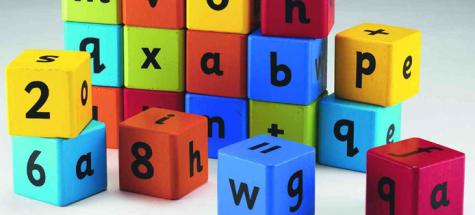I hope you're aware in your child's school that this week is Literacy and Numeracy Week. The idea behind it is to encourage the work in schools to improve children's literacy and numeracy, in a way that is not focussed on tests (such as NAPLAN) but is also a fun activity.
It includes an appointed day and time to Read for Australia - tomorrow (Wednesday) at 2pm - as well as a numeracy activity called This is Rubbish! The activity is designed for kids from Kindergarten through to Year 8. If you haven't heard about either of these, I would be disappointed - but I would also urge you to ask your children's school why not. Many schools don't opt-in because they think they're doing enough already, but I am of the view that it's good for schools to be part of the broader educational community and get involved in these activities, similarly with Walk to School Day.
I teach children older than Year 8, so I am not directly involved but I have keenly looked at what my grandchildren are doing.
I really like the numeracy exercise of This is Rubbish! as it requires students to collect rubbish, weight it, assess it, sort it. It's geared towards sustainability issues as well as giving students - depending on the year level - a better understanding of mathematical and statistical techniques.
The book that has been set for Read for Australia on Wednesday is a delightful book called Herman and Rosie by Australian author, Gus Gordon. It's set in New York and is a story about friendship, loyalty, life in the big city, never giving up and following your dreams. Some schools are also involved in an associated activity known as A Poem in your Pocket where children are encouraged to write poetry based on their thoughts of Herman and Rosie.
Asking your children about what they're doing for National Literacy and Numeracy Week is one way of showing them you're interested.
There are many other ways to encourage them in the basics of reading and mathematics also, and to encourage their development in these important areas. While there are different strategies for different age groups, here are my top three suggestions based on my life experience and my professional experience as a maths teacher for more than 30 years.
Literacy
1. Encourage your child to read and view a variety of text-based material. The newspaper (if you still get it) or a magazine; a digital story book; comics; emails; timetables; recipes; instructions for putting something together.
2. Encourage your child to talk and listen. It might be telling a joke, or everyone at the dinner table talking about something they did during the day, or explaining to a younger sibling or a grandparent (!) how to work something on the iPad.
3. Learn a new word a day. This takes some preparation, but pick a word a day in the morning and follow it up at dinner time.
Numeracy
1. Talk about mathematical occasions in your day-to-day activity. While this is also dependant on what you do during the day, some things which might be common are:
- how far is it to school or the shops - distance, time, steps?
- measuring out ingredients for a recipe and then doubling or halving the quantities to get it right for the family
- how far away from goal were they when they scored? how far did they run?
- adding up the purchases at the supermarket as you walk around the aisles.
2. Encourage them to do the mental arithmetic before they pay for something, so they know how much change they should receive. (It is amazing how regularly this can be wrong either way).
3. Talk openly about money issues and the need to have a budget for shopping, entertainment, transport and so forth, and why credit cards are only best used for convenience and should be paid monthly.
* * *
Find out more about Literacy and Numeracy Week 2013 here.
Check out our 7 book suggestions also!








 Agree (0)
Agree (0) Disagree (
Disagree (











__small.png)










